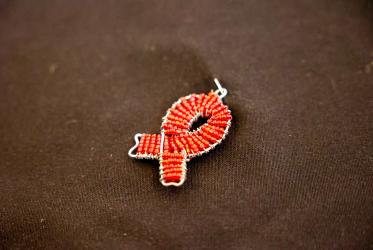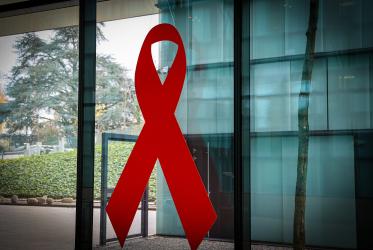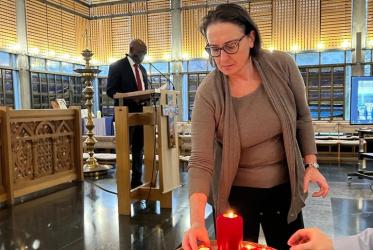The global epidemic - or "pandemic" - of the Human Immunodeficiency Virus (HIV) and the consequent Acquired Immunodeficiency Syndrome (AIDS) has evoked responses from many national governments, United Nations bodies and non-governmental organizations. There are many reasons for the churches to respond to this challenge and to join hands with the worldwide effort to provide care and support, to reduce vulnerability to HIV and to alleviate the impact of the pandemic.
For many of us HIV/AIDS has acted as a spotlight, exposing and revealing many iniquitous conditions in our personal and community lives which until now we have not been willing to confront. The pandemic reveals the tragic consequences of personal actions which directly harm others, and of negligence which opens persons to additional risk. It exposes any silence and indifference of the churches, challenging them to be better informed, more active and more faithful witnesses to the gospel of reconciliation in their own lives and in their communities.
Increasing numbers of people worldwide are falling sick, suffering physically, emotionally and spiritually - many in abandonment and desolation. Men, women, young people and children are dying; families and communities are severely affected socially and economically, particularly in less affluent countries. The effects of HIV/ AIDS are impoverishing people, breaking their hearts, violating their human rights and wreaking havoc on their bodies and spirits.
Jesus Christ demonstrated God's love to all human beings, coming to be present in the midst of human struggle. If the churches are to fulfill their mission, they must recognize that HIV/AIDS brings the lives of many people into crisis and that it is a crisis which churches
must face. The very relevance of the churches will be determined by their response. The crisis also challenges the churches to re-examine the human conditions which in fact promote the pandemic and to sharpen their awareness of people's inhumanity to one other, of broken relationships and unjust structures, and of their own complacency and complicity. HIV/AIDS is a sign of the times, calling us to see and to understand.
It was for these reasons that the central committee of the World Council of Churches, meeting in Johannesburg, South Africa, in 1994, mandated the formation of a consultative group to conduct a study on HIV/AIDS that would help the ecumenical movement to shape its response in the three areas of theology and ethics, pastoral care and the church as healing community, and justice and human rights. The study should challenge the churches to be more honest, more faithful and better informed - and to become communities which are safe places for people living with HIV/AIDS.
This study document is the result of that process. It sets the work done by sub-groups in each of the three areas within the overall framework of the global challenges posed by AIDS, and the urgent need for a faithful and creative response from the churches. The study document was received by the committee on WCC Programme Unit II (Churches in Mission : Health, Education, Witness) during the meeting of the central committee in September 1996. The full central committee welcomed the document and commended it to the churches for reflection and appropriate action.
The WCC central committee also officially adopted - signify-cantly, with no dissenting votes - a substantial concise statement on "The Impact of HIV/AIDS and the Churches' Response". This text, which distills and focuses the issues explored in the longer study document, is also included in this volume (see Appendix I, p.96).
The different sections of this report show some variations in style, reflecting the contributions of diverse group members and, in some cases, the characteristic tone and vocabulary of particular subject areas. The report also includes a number of texts printed within boxes. This material is of several different types, including statements by church bodies; testimonies, stories and personal narratives; case study material from focal churches; and excerpts from reports of scientific studies and from United Nations study programmes. These are
included to enrich and enliven the report, and to bring in a wider range of voices and expertise than is sometimes heard in the discussion within the churches about the HIV/AIDS pandemic.
The study process out of which these chapters have grown has itself been an ecumenical journey. People with experience and expertise in various fields related to HIV/AIDS, coming from all continents and many confessions, and including some persons living with HIV/ AIDS, came together to be a part of this journey.
The knowledge and opinions held by members of the consultative group were as diverse as their geographical and confessional backgrounds. The first task therefore was to listen to and to learn from each other. And this process was not always easy. It required a spirit of humility. There was tension between widely differing views, and long deliberation over sensitive issues. In the course of the study many firmly held convictions were rethought in the light of new information and the experience of others.
At various stages of this ecumenical journey members of the consultative group were exposed to the realities of communities and individuals living with HIV/AIDS and working in AIDS-related projects. During these exposure visits - which took place in South Africa , the USA and India - preliminary findings from the study were shared with local community members, and their comments invited. This was done to avoid producing an overly "academic" report far removed from the struggles, sufferings and celebrations of people's real lives. Many people, therefore, who were not officially part of the consultative group have contributed to the report and deserve credit for what has been achieved.
A most remarkable experience for those on this journey was the high degree of unity and common vision, despite differences and seemingly irreconcilable positions. All made a sincere attempt to comprehend the background and honest intentions of others, even if differing conclusions were reached in some areas. In this way, the study process was a true experience of ecumenical learning. There was also a sense among members of the group that God's Spirit was enabling them to accept each other as sisters and brothers working together for the common good. The rich worship life in all meetings and consultations was a constant source of inspiration and support. It brought discussions and resolutions into the presence of the living
God who is there as we gather to pray, sing, learn, mourn and celebrate life.
This report, therefore, is written with the firm conviction that we do not "possess" the truth but are constantly to search for God's will in a changing world. In the worldwide struggle to find answers to the challenge of HIV/AIDS there are almost every day new discoveries, new information, new responses and new reports on how communities are affected by this pandemic. No report issued at any particular point in time will provide the final answers to this challenge; it can only be part of a continuing process.
It must also be remembered that issues related to HIV/AIDS are extremely complex. While HIV is a virus and AIDS the medical consequence of viral infection, the related issues are far from being simply medical or clinical concerns. They affect, and are affected by, cultural norms and practices, socio-economic conditions, development and gender issues, sexuality and many other factors.
This report approaches the challenge of HIV/AIDS from different perspectives: science, the socio-economic context, theology, ethics, human rights, the churches as healing communities, pastoral care and education. All these aspects are interlinked, and cannot be completely separated from one another. Specific aspects, however, are identifiable within the report for readers who wish to refer to issues of particular interest to them.
Even though this report is part of an ongoing process, and the issues are extremely complex, readers should not be discouraged. They should not succumb to pessimistic resignation or puzzled inactivity. Individuals, communities and countries are in urgent need because of the continued spread of the pandemic. The lives and wellbeing of countless people rely on decisions and actions which are required today. All institutions, not least the churches and their congregations, bear a great responsibility in responding to this challenge, and must help all people and their communities to the best of their knowledge and ability.
From the beginning of the pandemic some Christians, churches and church-related institutions have been active in education and prevention programmes, and in caring for people living with HIV/ AIDS. The consultative group was privileged to have worked with several of these during the study. But it is the judgment of the group
that by and large the response of the churches has been inadequate and has, in some cases, even made the problem worse. As the WCC executive committee noted in 1987, "through their silence, many churches share responsibility for the fear that has swept our world more quickly than the virus itself". [1] Sometimes churches have hampered the spread of accurate information, or created barriers to open discussion and understanding. Sometimes they have reinforced racist attitudes by neglecting issues of HIV/AIDS because it occurs predominantly among certain ethnic or racial groups, who may be unjustly stigmatized as the most likely carriers of the infection.
The situation calls for a fresh resolve by the churches to address the challenge of HIV/AIDS directly. This report seeks to enable churches, their members and leaders to act courageously and to make well-informed decisions in the light of the information currently available. Initiatives adapted to local situations must be taken in response to the real needs of individuals and communities affected by HIV/AIDS. But action requires first awareness-building and, not least, openness to acknowledging and discussing sensitive issues related to this pandemic.
Finally, it is the churches themselves which are affected by HIV/ AIDS, and their credibility depends on the way in which they respond. They are confronted with people, members of the body of Christ, who not only seek support and solidarity, but who ask: Do you want to be my brother and sister?
http://www.wcc-coe.org/wcc/what/mission/ehaia-html/app3.html
[1] Quoted in the Minutes of the 38th meeting of the WCC central committee, Geneva , WCC, 1987, Appendix VI, "AIDS and the Church as a Healing Community", p.135.





